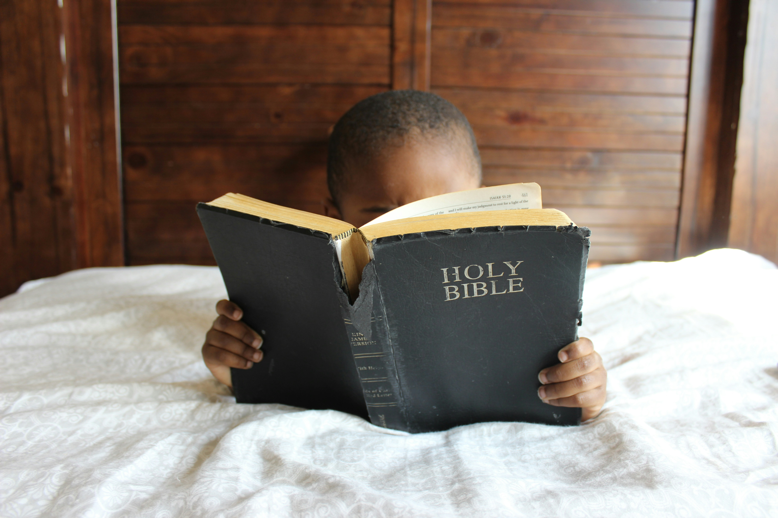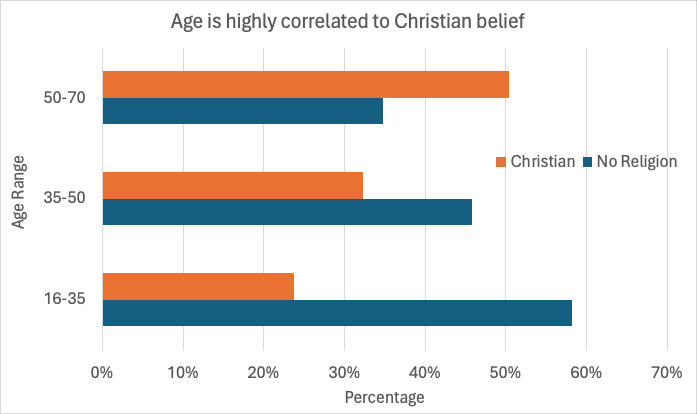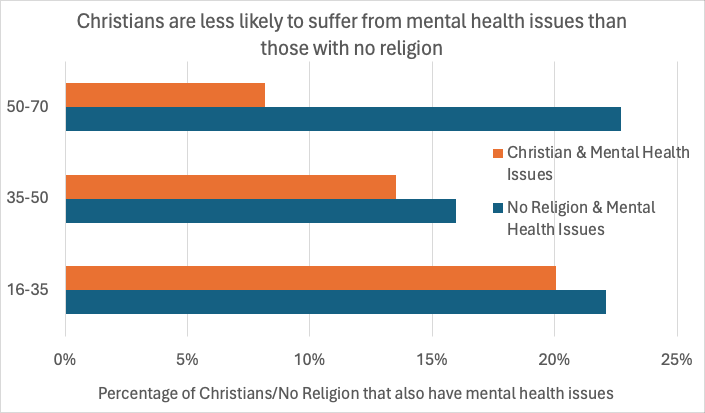The Impact of the Generational Decline in Religious Belief
16th April 2024 by Mark Holt
Insights from Divrsity EDI Surveys

We recently ran a Diversity and Inclusion survey for an organisation where the percentage of people with a religious belief were wildly different to the surveys we'd run before (and different to the UK's Office of National Statistics data on religion).
Since the Divrsity platform automatically helps organisations identify and understand these kind of unusual data-points, we were immediately intregued to use the platform's data-analysis capabilities to understand the drivers.
Spoiler: you can guess from the title that this organisation had a significantly older demographic than our average workplace. So we decided to analyse to normalise and analyse our entire aggregated data set to understand how this phenomenon plays out at a macro-level...
Note: This article focuses entirely on Christianity since the data set is large and easy to interpret. After "No Religion" and "Christian", the next largest demographic is participants answering "Prefer Not to Say" (circa 6%). [Why people are uncomfortable disclosing their religion is certainly an interesting subject to dig in to 🤔].
Introduction
Religion has been a cornerstone of British society for centuries, shaping the country's culture, values, and beliefs. However, according to our data (which is naturally skewed toward working age population), there are now significantly more people in the UK who are not religious than those who are; with different age groups exhibiting distinct patterns of belief.
Aggregating analysing our (aggregated) data sets, yielded the following interesting chart.

This shows that:
- 50% of people between 50 and 70 identify as Christian, compared with just 22% of those between 16 and 30
- At the same time, 58% of people between 16 and 30 checked the No Religion box (or Atheist or Agnostic).
As mentioned above, those chosing not to disclose their religion were a consistent 7% across all age groups.
The Decline of Religion Among Younger Generations:
This decline is corroborated by a large number of studies that consistently show younger generations in the UK are becoming increasingly disconnected from organized religion. According to the 2019 dataset from the Office for National Statistics (ONS) , only 15% of 16-24-year-olds identified as "Christian," compared to 57% of those aged 65 and over. This trend is also reflected in other surveys, such as the super-interesting British Social Attitudes Survey (BSA) which "charts a continuation of a long-term decline in religious identity, religious observance, and religious belief in Britain".
These studies posit a number of overlapping reasons for the decline of religion in the UK:
- One major factor is the increasing diversity of the population and the growing acceptance of non-religious beliefs. As the UK has become more diverse, people have become more open to exploring different spiritual practices and belief systems.
- Another factor is the changing role of religion in society. In the past, religion played a central role in shaping social norms and values. However, as society has evolved, the influence of religion has waned, and other factors such as science, technology, and individualism have become more prominent. Consequently, individuals entering adulthood are increasingly reliant on evidence-based reasoning and skepticism, which can lead them away from religious beliefs.
- And no blog post would be complete without a mention of the rise of social media and online communication that have certainly facilitated the exchange of ideas and perspectives; allowing young people to question and challenge traditional religious views more easily.
The Strength of Religion Among Older Generations:
While younger generations are turning away from organized religion, our data shows that individuals later in their careers are remaining steadfast in their beliefs. Apparently this is effect is stronger amongst still older generations (where we don't have the data) with the ONS survey finding that 65% of those aged 65-74 and 57% of those aged 75 and over identified as "Christian."
One possible reason for this difference is the role of religion in shaping cultural identity and community among older Britons. Many individuals in this age group grew up with strong religious influences and traditions, which have become integral to their sense of self and belonging. This attachment to religion can be more difficult to dislodge as people age, particularly if they are part of close-knit religious communities.
Christian Belief correlates with better Mental Health!
While researching this article, we came across a study published in the Journal of Positive Psychology which found that religious and spiritual beliefs were associated with higher levels of well-being and life satisfaction.
Additionally, religious communities often provide social support and a sense of belonging, which can be beneficial for mental health. According to another study published in the Journal of Social and Clinical Psychology, people who attended religious services more frequently reported higher levels of social support and lower levels of depression.
At the aggregate level, our data also confirms this finding!

Overall, 21% of people with no religion reported either a diagnosed or undiagnosed mental health issue, versus just 14% of those identifying as Christian!
However, when we also control for age, we see that the correlation between religion and improved mental health is extremely strong amongst an older demographic; and less prounounced (although certainly not negligible) amongst younger people.
The Impact of religious decline on the Church
There's nothing quite like an Internet-rabbit hole... Seeing such a singnificant generational decline made me wonder how the church will cope with such a signiicant reduction in revenues...
According to Save The Parish ( https://www.savetheparish.com/church-of-england-finances/), the Church of England has £10.4bn of investments which generate ~£334m a year in income.
Churchgoers donations represent £0.9bn in revenue, and £4.2bn of land/buildings investments yield a further £0.1bn.
So, assuming constant population, the church will see donations reduce by £403m over the next 15 years, with a further £155m over the following 20 years (so a reduction in donations from £900m to £341m).
With 12,500 listed buildings that require upkeep and an aging clergy driving an increased pension bill, the implications are pretty significant...
Conclusion
I've always been fascinated by the ability for data to tell a story and it's amazing to see our surveys as a microcosm of macro shifts in the UK's beliefs and attitudes.
My youngest is six months old. It's highly absorbing to imagine how this macro shift will impact the world when she becomes an adult... The data tells us that the once-ubiquitous sound of Sunday morning hymns will likely be replaced with the hum of social media chatter and she will see christianity in the same way that we see Norse Mythology.
More Blog Articles
- It's sometimes tricky to balance religious freedom with LGBTQIA+ issues, so we've written an article about best practices
- Since we're asking such personal questions, learn how Divrsity is Obsessed with Anonymity
- Caring Responsibilities are a super-interesting dimension of our surveys
- How does the Divrsity AI work?
- Use Collective Surveys to survey employees who don't work at a desk
- Learn why we created Divrsity
- Or explore one of the articles in our Diversity Dictionary Series:
Intersectionality,
Ableism, and
Transgender